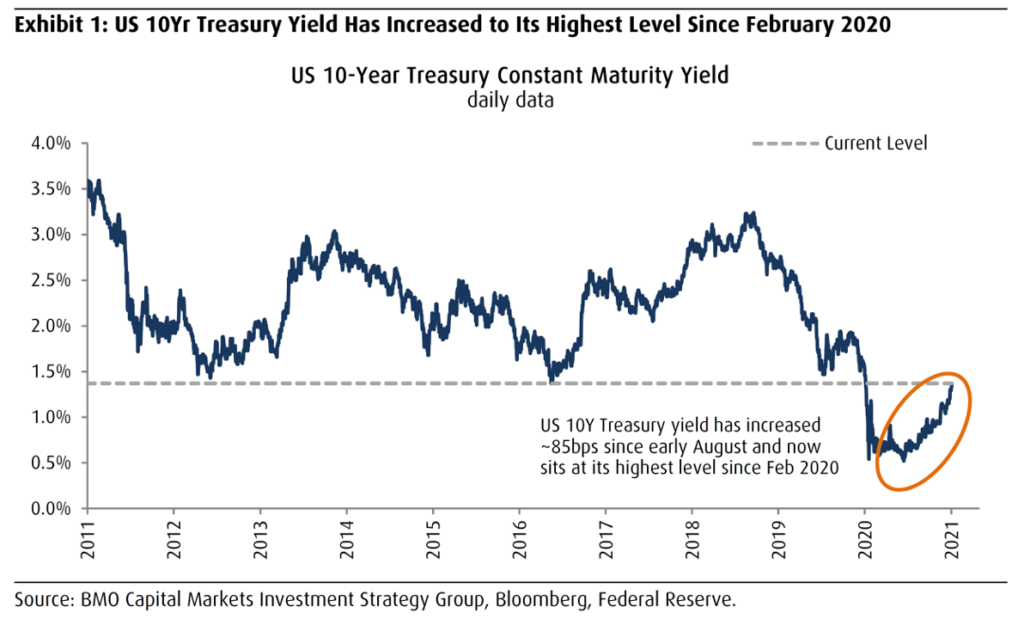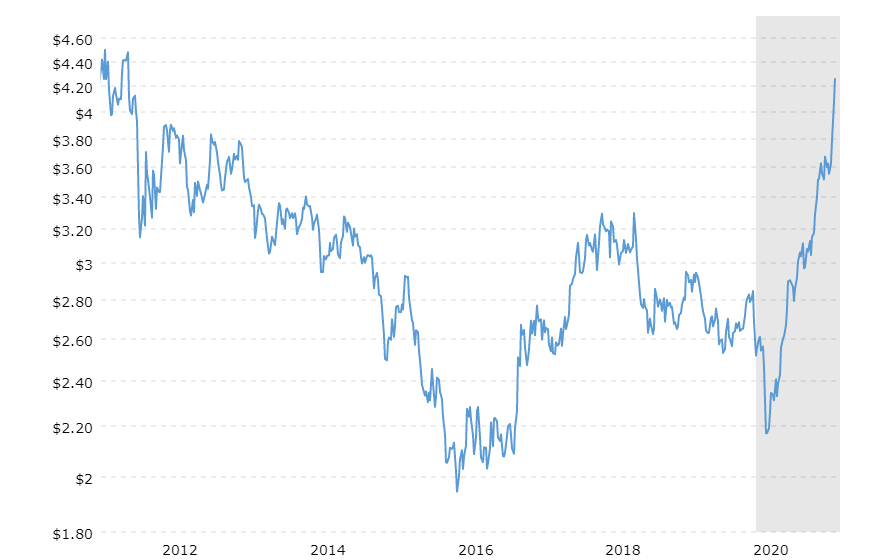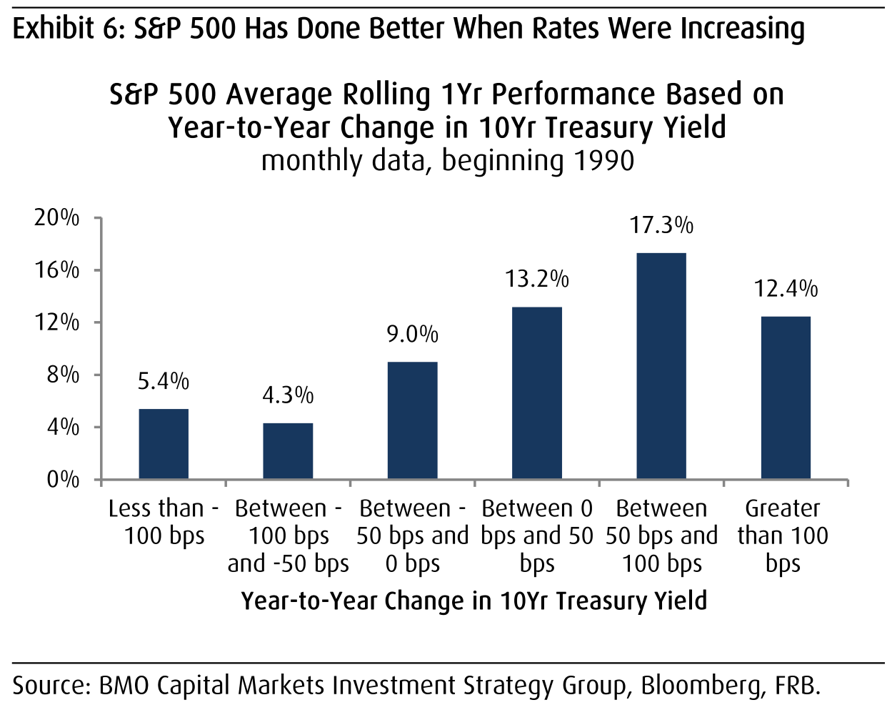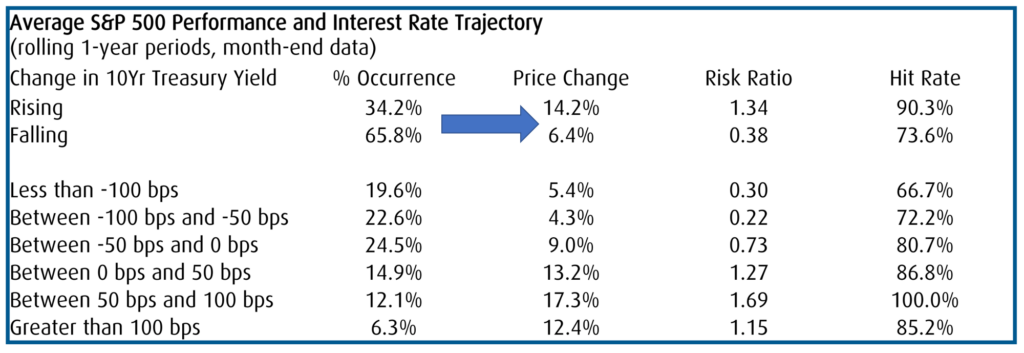The implications of rising bond yields for the stock market:
Global stock market volatility has increased in recent weeks and this was especially apparent yesterday when the MSCI World Index fell by 1.5%. The US markets were even more volatile with a decline of 2.5% in the S&P 500 and a drop of 3.5% in the Tech-heavy Nasdaq Index. One of the key factors driving the increase in volatility is the recent spike in bond yields. As seen in the chart below, the US 10-year Treasury Yield has increased to its highest level since February of 2020.

As equity investors, it’s always important to pay attention to what’s happening in the bond market given its track record of providing valuable information for the economy and the stock market.
Our first observation of the chart above is that although yields have spiked, they are bouncing off a decade-low level. And the reason we reached this depressed level is due to COVID. As we all know, COVID led to lockdowns around the world and the deepest recession since the Great Depression. Although hyperinflation is not a concern of ours, there are many signs that inflation could pick up as the global economy returns to normal. One of the most obvious signals is coming from commodity markets. Copper is especially interesting given its widespread application across most sectors of the economy. Doctor Copper is market lingo for this base metal as market commentators like to joke that copper has a “Ph.D. in economics” given its ability to predict turning points in the global economy. Copper is used extensively across various sectors of the economy including homes, factories, electronics, and power generation & transmission. As a result of this, demand for copper is often viewed as a reliable leading indicator of economic health and this demand is typically reflected in the market price of copper.
At a recent price of $4.26, copper is back to levels not seen in a decade, as seen in the chart below.

And it’s not just copper that has made a comeback. There has been a significant price move across the commodities spectrum including iron ore, oil, and nickel. From our perspective, the move in commodities is a sign that the global economy is recovering from the COVID downturn. The recent rise in bond yields is another sign that the global economy is normalizing. Given the recent upward move in yields, investors are now wondering if higher interest rates are bad for stocks. This is a legitimate concern given the recent move in bond yields and the expectation that yields will continue to move higher as the global economy recovers from COVID. If stock market history can be used as a guide, equity market investors should not be too concerned about higher interest rates. Over the last 30 years, the S&P 500 has performed better when interest rates are increasing, as seen in the chart below.

BMO Capital Markets recently analyzed various interest rate cycles over the last 30 years and determined that low levels of interest rates are not necessarily the best environment for US stock market performance. For example, the S&P 500 has generated stronger average returns at higher levels of interest rates compared to lower levels of interest rates. This makes sense because low-rate environments are usually the result of sluggish economic growth. What the analysis shows is that rising interest rates have been good for US stock market performance, especially when rising rates are occurring off a low base as they are today.
Over the last 30 years the S&P 500 has posted an average price return of 14.2% during periods of increasing rates. This compares to an average price return of 6.4% during periods of falling rates as seen in the chart below.

In summary, the recent spike in bond yields has led to an increase in market volatility. However, this pullback should be taken in the context of global stock market indexes that have surged by approximately 70% from the lows in March of 2020. Market pullbacks or market corrections are inevitable given that they happen every year, even during strong bull markets. As we all know, stock markets do not go up in a straight line. While it’s not enjoyable to see a decline in the value of our investments, these stock market sell-offs typically generate attractive buying opportunities. And that’s where our efforts will be focused so that we can take advantage of these opportunities as they are come our way.
Have a great weekend,
Phil
*Cumberland and Cumberland Private Wealth refer to Cumberland Private Wealth Management Inc. (CPWM) and Cumberland Investment Counsel Inc. (CIC). NCM Asset Management Ltd. (NCM) is the Investment Fund Manager and CIC is the sub-advisor to the Kipling and NCM Funds. CIC is also the sub-advisor to certain CPWM investment mandates. This communication is for informational purposes only and is not intended to provide legal, accounting, tax, investment, financial or other advice and such information should not be relied upon for providing such advice. Reasonable efforts have been made to ensure that the information contained herein is accurate, complete and up to date, however, the information is subject to change without notice. Information obtained from third parties is believed to be reliable but no representation or warranty, express or implied, is made by the author, CPWM or CIC as to its accuracy or completeness. The communication may contain forward-looking statements which are not guarantees of future performance. Forward-looking statements involved inherent risk and uncertainties, so it is possible that predictions, forecasts, projections and other forward-looking statements will not be achieved. All opinions in forward-looking statements are subject to change without notice and are provided in good faith but without legal responsibility. Past performance does not guarantee future results. CPWM and CIC may engage in trading strategies or hold long or short positions in any of the securities discussed in this communication and may alter such trading strategies or unwind such positions at any time without notice or liability. CPWM, CIC and NCM are under the common ownership of Cumberland Partners Ltd



